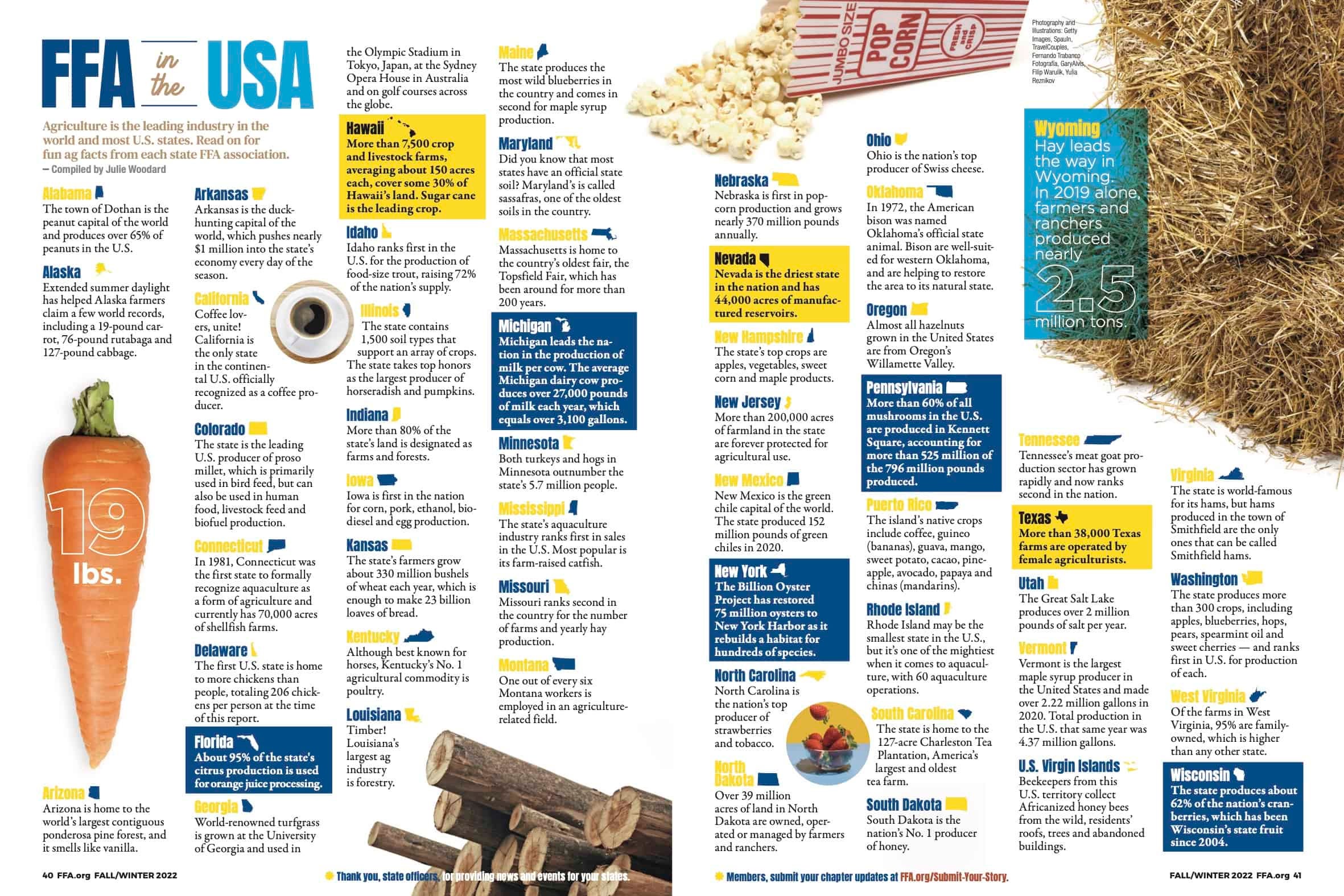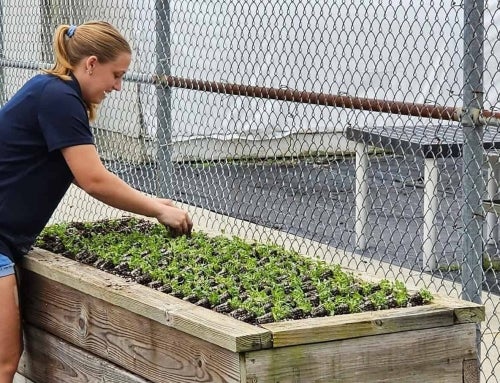Agriculture is the leading industry in the world and most U.S. states. Read on for fun ag facts from each state FFA association.
Alabama
The town of Dothan is the peanut capital of the world and produces over 65% of peanuts in the U.S.
Alaska
Extended summer daylight has helped Alaska farmers claim a few world records, including a 19-pound carrot, 76-pound rutabaga and 127-pound cabbage.
Arizona
Arizona is home to the world’s largest contiguous ponderosa pine forest, and it smells like vanilla.
Arkansas
Arkansas is the duck-hunting capital of the world, which pushes nearly $1 million into the state’s economy every day of the season.
California
Coffee lovers, unite! California is the only state in the continental U.S. officially recognized as a coffee producer.
Colorado
The state is the leading U.S. producer of proso millet, which is primarily used in bird feed, but can also be used in human food, livestock feed and biofuel production.
Connecticut
In 1981, Connecticut was the first state to formally recognize aquaculture as a form of agriculture and currently has 70,000 acres of shellfish farms.
Delaware
The first U.S. state is home to more chickens than people, totaling 206 chickens per person at the time of this report.
Florida
About 95% of the state’s citrus production is used for orange juice processing.
Georgia
World-renowned turfgrass is grown at the University of Georgia and used in the Olympic Stadium in Tokyo, Japan, at the Sydney Opera House in Australia and on golf courses across the globe.
Hawaii
More than 7,500 crop and livestock farms, averaging about 150 acres each, cover some 30% of Hawaii’s land. Sugar cane is the leading crop.
Idaho
Idaho ranks first in the U.S. for the production of food-size trout, raising 72% of the nation’s supply.
Illinois
The state contains 1,500 soil types that support an array of crops. The state takes top honors as the largest producer of horseradish and pumpkins.
Indiana
More than 80% of the state’s land is designated as farms and forests.
Iowa
Iowa is first in the nation for corn, pork, ethanol, biodiesel and egg production.
Kansas
The state’s farmers grow about 330 million bushels of wheat each year, which is enough to make 23 billion loaves of bread.
Kentucky
Although best known for horses, Kentucky’s No. 1 agricultural commodity is poultry.
Louisiana
Timber! Louisiana’s largest ag industry is forestry.
Maine
The state produces the most wild blueberries in the country and comes in second for maple syrup production.
Maryland
Did you know that most states have an official state soil? Maryland’s is called sassafras, one of the oldest soils in the country.
Massachusetts
Massachusetts is home to the country’s oldest fair, the Topsfield Fair, which has been around for more than 200 years.
Michigan
Michigan leads the nation in the production of milk per cow. The average Michigan dairy cow produces over 27,000 pounds of milk each year, which equals over 3,100 gallons.
Minnesota
Both turkeys and hogs in Minnesota outnumber the state’s 5.7 million people.
Mississippi
The state’s aquaculture industry ranks first in sales in the U.S. Most popular is its farm-raised catfish.
Missouri
Missouri ranks second in the country for the number of farms and yearly hay production.
Montana
One out of every six Montana workers is employed in an agriculture-related field.
Nebraska
Nebraska is first in popcorn production and grows nearly 370 million pounds annually.
Nevada
Nevada is the driest state in the nation and has 44,000 acres of manufactured reservoirs.
New Hampshire
The state’s top crops are apples, vegetables, sweet corn and maple products.
New Jersey
More than 200,000 acres of farmland in the state are forever protected for agricultural use.
New Mexico
New Mexico is the green chile capital of the world. The state produced 152 million pounds of green chiles in 2020.
New York
The Billion Oyster Project has restored 75 million oysters to New York Harbor as it rebuilds a habitat for hundreds of species.
North Carolina
North Carolina is the nation’s top producer of strawberries and tobacco.
North Dakota
Over 39 million acres of land in North Dakota are owned, operated or managed by farmers and ranchers.
Ohio
Ohio is the nation’s top producer of Swiss cheese.
Oklahoma
In 1972, the American bison was named Oklahoma’s official state animal. Bison are well-suited for western Oklahoma, and are helping to restore the area to its natural state.
Oregon
Almost all hazelnuts grown in the United States are from Oregon’s Willamette Valley.
Pennsylvania
More than 60% of all mushrooms in the U.S. are produced in Kennett Square, accounting for more than 525 million of the 796 million pounds produced.
Puerto Rico
The island’s native crops include coffee, guineo (bananas), guava, mango, sweet potato, cacao, pineapple, avocado, papaya and chinas (mandarins).
Rhode Island
Rhode Island may be the smallest state in the U.S., but it’s one of the mightiest when it comes to aquaculture, with 60 aquaculture operations.
South Carolina
The state is home to the 127-acre Charleston Tea Plantation, America’s largest and oldest tea farm.
South Dakota
South Dakota is the nation’s No. 1 producer of honey.
Tennessee
Tennessee’s meat goat production sector has grown rapidly and now ranks second in the nation.
Texas
More than 38,000 Texas farms are operated by female agriculturists.
Utah
The Great Salt Lake produces over 2 million pounds of salt per year.
Vermont
Vermont is the largest maple syrup producer in the United States and made over 2.22 million gallons in 2020. Total production in the U.S. that same year was 4.37 million gallons.
U.S. Virgin Islands
Beekeepers from this U.S. territory collect Africanized honey bees from the wild, residents’ roofs, trees and abandoned buildings.
Virginia
The state is world-famous for its hams, but hams produced in the town of Smithfield are the only ones that can be called Smithfield hams.
Washington
The state produces more than 300 crops, including apples, blueberries, hops, pears, spearmint oil and sweet cherries — and ranks first in U.S. for production of each.
West Virginia
Of the farms in West Virginia, 95% are family-owned, which is higher than any other state.
Wisconsin
The state produces about 62% of the nation’s cranberries, which has been Wisconsin’s state fruit since 2004.
Wyoming
Hay leads the way in Wyoming. In 2019 alone, farmers and ranchers produced nearly 2.5 million tons.












